- Home
- Rudy Rucker
Nested Scrolls Page 3
Nested Scrolls Read online
Page 3
“Ei, ei!” Hegel exclaims in his diary, falling into German. “Imagine people still thinking like this in the year of 1785!”
My guess is that the human mind will never fully modernize. Our myths express something deep about our situation in the world, and we’ll always have a place for fantastic tales.
The Suburbs
On the lot next to us, a man named Jones started building a house in 1952. When I went over to inspect the project, one of the carpenters teased me.
“Look out, boy, here comes the chicken!”
Hearing a wild squawking and cackling, I climbed up the exposed two-by-fours to the rafters. Getting away from that chicken. The workmen had a good laugh at me.
Behind our house, beyond the old rye field, bulldozers and earthmovers began carving the Russell farmlands into a big subdivision. The suburbs were coming to swallow us.
As a child I wasn’t nostalgic. I never thought of revisiting that old farmhouse where I’d been born, even though it remained standing on a side road of the growing development.
One day two boys with Mohawk haircuts appeared in our front yard. My brother Embry got into a fistfight with them, and drove them away.
Another day, Embry and I saw a very strange aircraft fly over our yard—an airplane with no fuselage or tail. Embry said it was a flying wing. He said that maybe the boys with Mohawks had come from it.
Our lot butted right onto Rudy Lane. We had two acres, an expanse which my brother was proud of—he said we should call our estate “Twakers,” but nobody else in the family picked up on that. Embry always had this sense of being a noble, but that worldview of his never caught on with anyone we knew.
Across Rudy Lane the Merrifield subdivision appeared, with about fifteen houses. In 1953 when I was seven, a family with two boys the ages of Embry and me moved into Merrifield. Jimmy and Paul Stone.
Their mother, Faith Stone, was a sexy, vivacious woman. She had red hair, big breasts and an infectious laugh. Once a year she’d get depressed and get electroshock therapy, and then she’d tell stories about it at dinner, laughing about her memory loss. She seemed artistic and exotic, not like a typical Mom. Sometimes Faith would tell off-color jokes that I couldn’t understand. I remember one that took me weeks to figure out:
“Did you hear about the cannibal who passed his brother in the swamp?”
The father, Jim Stone, was witty and worldly-wise. He and my father used to call each other Dad and Duke. They’d drink bourbon together. Old Jim had gone to Harvard. He liked to tell the story of how he and some college pals had gotten hold of a red Communist flag with a hammer and sickle, and before dawn after a night of revelry, they’d hauled it up on a flagpole in front of the State Department in Washington, D.C.
Once when I was over at the Stones’ house playing with Paul, I really had to go to the bathroom, but I put it off too long, and when I got there, a turd shot out of my butt and landed on the tile floor next to the toilet. I figured it wasn’t my affair to deal with this, so I refastened my pants and went back into the yard to play.
A little later, Paul’s mother came out and looked at me with a strange expression. “Rudy—were you in the bathroom?”
“Um, yes.”
“Did you have an accident?”
“It popped out,” I said, wanting the conversation to end. “I couldn’t help it.”
“Can you go in there and clean it up?”
I was a little outraged at this request, but grudgingly I did the dirty work. The other boys found out and laughed at me.
Paul Stone had a devil-may-care attitude that I admired. He and his brother watched Abbott and Costello on TV. Paul wasn’t at all interested in school. When his father pointed out the bright dot of Venus above the horizon, Paul imitated him.
“Look, boys, there’s a weenis in the sky! Psss.”
Paul had a lot of pocket money and once he paid a neighbor girl to show him her naked butt.
“What was it like?”
“She had freckles.”
While Paul was cool and sleepy-eyed, his big brother Jimmy had a florid, volatile personality. It wasn’t unusual for Jimmy to have a fit of anger, or to burst into tears. He and Embry looked down on Paul and me.
Once Jimmy was angry at me and he yelled, “Your parents spoil you rotten. They wouldn’t care if your big brother got run over by a truck!”
I weighed this in my mind, feeling a little guilty, but also enjoying the thought that maybe my parents did like me best. Why wouldn’t they? Actually, it wasn’t till I was about fifty that I realized that my parents really had loved my brother as much as me.
Sometimes Paul and Jimmy seemed to be alone in their house—or maybe it was that their mother was napping. Things could get wild.
One time Jimmy had a bright idea that could have killed Paul and me. He and Embry more or less forced us younger brothers to get inside a trunk in the basement, which they closed and latched. They said it was a game, they said they were playing kidnappers.
And then Paul and I were in the dark trunk, cramped and worrying about having enough air. Jimmy and Embry went totally hyper, running all around the house, upstairs and down, whooping and roaring, fully knowing they were in the wrong. Finally they came back and let us out. I never obeyed Jimmy again.
For one of his birthdays, Embry got an air-pump BB gun. It came with a Safety Oath inscribed on the butt of the gun, and I saw Embry reading this oath aloud for my father.
But pretty soon he got tired of shooting at cans.
We got together with the Paul and Jimmy and hid in a cluster of trees beside Rudy Lane at the bottom of our long front yard. Jimmy had a pelletgun pistol. He and Embry took turns shooting at passing cars. It was great.
Eventually a pickup truck stopped, and a man jumped out. We four boys ran terrified up the long yard and hid behind our house. After a half hour went by—and the truck was gone—we made our way back to our hide-out amid the trees. The guy in the truck had left a note, tucked into Paul’s shoe, which had dropped off in our frenzied retreat.
“Boys, I know all your names and where you live. I’m going to report you to your parents and to the police.”
Horrors! The Stone boys slunk home, and Embry and I mooched around our house, quietly waiting for doom. In the end, nothing happened. The man had been bluffing. But we didn’t shoot at cars anymore.
Paul and Jimmy’s father owned part of an island in the Ohio River near Louisville. It was called Four Mile Island. He pastured some cows there. The only way to get to the island was via a rickety ferry made of wood planks and empty barrels.
The ferry’s pilot was an aged hillbilly with most of his teeth missing. He was voluble and cackling. I was scared of him; I wasn’t used to being around strangers.
On the island, the air was filled with the racket of the seven-year locusts, oversized flying grasshoppers the length of a man’s finger. Paul and I found the empty amber shell of a locust clamped to the bark of a tree—they repeatedly shed their skins as they grew.
I brought the locust shell back home with me, carefully guarding it as we rode the ferry back across the mud-brown Ohio River. I treasured it for years.
My mother befriended some of the other women who moved into the Merrifield homes. Once she took me over to Mrs. Holland’s house for a visit. Mrs. Holland’s husband had given her a large box of candy for her birthday. He worked at General Electric. Mrs. Holland told me that I could pick one of the candies and eat it.
While my mother and Mrs. Holland chatted in the living-room, I studied the box of candy in the hall. It was the first box of chocolates I’d ever seen. It bothered me that I couldn’t see what was inside the cores—so I had the idea of gnawing off a corner of one, just so I could peek inside. It looked like it had strawberry jam inside it, which I didn’t want, so I gnawed off a few more corners, finding green mint goo, pink cherry paste, caramel, and eventually one that was filled with chocolate. I ate that one.
When Mrs. Holland offered
the box to my mother, the women noticed the gnawed corners. I was in disgrace. My big brother loved this story. He always liked when I did something completely uncouth.
It wasn’t so much that Embry wanted to see me get in trouble—it was more that he liked to see social norms being flouted and undermined. One of his favorite stories was about a little boy on the radio who’d been asked what he got for Christmas—and the little boy said, “Garbage.”
Embry was in some sense destined to be a 1950s-style juvenile delinquent, and from the very start he was getting into trouble at school. He seemed to change schools every couple of years.
Most days our dog Muffin would wander all around the neighborhood. One night in 1953, she didn’t come home for dinner. My parents and my brother kept saying that Muffin would be fine. But I was sure she was in danger. I almost thought I could hear her.
I cried and fretted so much that finally my father got Mr. Keith to go out with him with a flashlight and look for Muffin. They found her swimming in the septic tank of that big old farmhouse we’d once rented. The wooden cover of the tank had rotted away, and Muffin had fallen in. For hours she’d been dog-paddling around, yelping for help. I really had heard her. I had better ears than the others.
We sprayed Muffin with the hose in the back yard, and fed her a big meal. She shook off the water and rubbed against us, vibrating with joy at being alive, with pleasure at rejoining our pack.
Saturday mornings, I’d listen to the “Big John and Sparky Show” on the family radio. My brother and my parents weren’t interested in this show, so I’d listen to it alone, lying on the wood floor next to a gently breathing heater vent, sometimes with Muffin at my side.
The show was “for the young and the young at heart”—and even then I suspected that, in this context, “young at heart” meant “simple-minded.” Big John was a square Dad type, and Sparky was a shrill elf. They’d acoustically transport the listeners to the “land over the rainbow”—wheee!—and the show would begin, the air around us shimmering in veils of pastel color.
I remember one particular radio play that they aired, “The Odyssey of Runyon Jones.” It was about a kid who travels across the galaxy, looking for his dead dog in “curgatory.” I really liked that story. It might have been the first science fictional tale that I absorbed.
In the early 1950s, my father owned a business called the Rucker Corporation—his men made inexpensive coffee tables and end tables which he sold through distributors in Chicago. Every so often he’d take the train to regional furniture fairs with a sample table in tow. When Pop had to take a trip, he’d tell me that he was going to the Fat Man’s Convention, and I believed him. Not that he was actually fat—he was in fact quite fit—but he was certainly the biggest person I knew.
Over time he began doing most of his business through a pair of brothers named Reinisch, from Chicago. One time these two visited Louisville, and they came to our house for a meal. Mom didn’t like them, because after dessert they belched and picked their teeth. And I think the Reinisches played some part in driving the Rucker Corporation into bankruptcy fairly soon after that.
But Pop quickly rose from the ashes with a more limited kind of company, Champion Wood Products. Rather than manufacturing entire pieces of furniture, Champion made small wood parts, which they wholesaled to furniture makers. They might produce two thousand drawer-backs, for instance, or ten thousand of the little rectangular wood blocks that are glued into the join where a drawer back meets a drawer bottom.
As Champion Wood’s business involved making custom wood parts of specific sizes, they were called a dimension manufacturer. The term is a nice prefiguring of what I’d later end up doing myself—as a writer of science fiction and popular science books involving the fourth dimension.
The men who worked in Pop’s plant were wild and intimidating, almost like they were from a different race. Their skins were pale, pale white. They had missing front teeth, prominent chin-stubble, oily black hair, and mad, intent eyes. Their Kentucky and Indiana accents were so baroque that it was hard for me to understand them.
The few times I visited Pop’s plant, I imagined that the men looked upon me as soft and pampered. The bathroom there had intensely obscene graffiti, some of it directly aimed at the boss’s family and, by extension, at me. Just to show the men I wasn’t a prissy Lord Fauntleroy, I wanted to emerge from the john yelling all the curse words I knew. Of course I never actually did this, but perhaps something of this attitude carried over into my writing. Like—how can anyone dismiss me as an ivory-tower intellectual if my books have bad words in them?
When Pop got home from work every day, we’d have a family dinner around our shiny wooden dining table. Often he’d start the meal with one of his standard jokes.
“Did you boys hear about the big explosion today?”
“No,” we’d say, playing it straight.
“The wind blew up the Ohio River!”
One time Embry and Mom worked out a trick to play on the old man. Mom had gotten a long string of plastic snap-together Pop-It beads—a new fad in the 1950s. They were shiny and creamy-white, vaguely resembling pearls. At dinner, Mom wore her new necklace and asked my father if he liked it. As we’d expected, he said something about it being a little long.
“All right!” cried my mother. “I’ll throw it away!” She unpopped the necklace into five or six pieces and threw them on the floor. We boys cackled in joy,
“What is it with you weisenheimers?” asked my father.
On Sundays we’d have roast beef, gravy, and rolls. Before carving the roast, my father would sharpen his carving knife. I loved the sound of this. Pop had a special bone-handled carving set, with a matching sharpening stick.
Sometimes I’d take out the bone-handled steel sharpening stick and play with it. It had a powerful aura, like a scepter. With the tool in hand, I’d hide in a corner of the living-room behind my father’s armchair, feeling safe and strong—possibly with some stray thoughts of taking down the old man.
Back to the dinner table. I loved eating rolls with butter and the plum jam that my mother and her friend Sally Keith made. One time Embry and my parents weren’t paying attention to me, and the basket of rolls was next to me, and I ate them all.
From then on, Embry liked to glance over me during meals and ask, “More rolls, Rudy?”
I didn’t usually pay that much attention to the table conversation, I tended to be off in my own world. Once Embry and my father suddenly got into such a big argument that Pop smacked Embry and knocked him out of his chair. But Pop never raised his hand against me, even after I grew as rebellious as my brother. I think Embry wore him down.
Pop was a great story-teller; sometimes after our Sunday dinner or evening meal, he’d spin tales for my brother and me. The stories were always different, but they usually involved dwarves. Pop would always give me and Embry special looks just to make sure we understood that we ourselves were in fact the dwarves he was talking about.
One event would flow into the next in a logical yet unpredictable fashion—and sometimes a story would run over from one day to the next. Pop prided himself on making up his stories as he went along. He said that if you just kept on talking, the ideas would come. Later, when I became a writer, I used this lesson.
Sometimes at the end of the meal, my mother would bring out an apple pie. We had a triangular silver spatula for serving pie slices. Pop would ask us boys to fetch it from the sideboard.
He’d say, “Can you bring me the shovel?”
Once, in the richness of his wit, my brother had the idea of instead running out to the garage and fetching a gardening shovel. We pulled this routine several times over the years.
Pop always wanted to have a piece of cheddar cheese with his pie, but Mom didn’t like to see that. She thought it was tacky to eat pie that way. Nobody had eaten cheese with pie in Berlin when she was growing up. So Pop would go out to the kitchen and fetch his slice of cheese himself. We boys didn’t
dare ask for any.
In 1950, Mom took Embry and me on a trip to Germany to visit her parents and her brothers. We went by air, via a series of planes that stopped in New York, Newfoundland, Iceland, and Ireland on the way. In Germany, World War II was still not so far off, and a lot of the buildings on my grandparents’ street were just piles of pink bricks. You weren’t supposed to climb on the bricks because the piles might collapse, and there might be some unexploded bombs under them.
My grandfather, Rudolf von Bitter, taught Embry and me to play chess. And then he pitted us against each other in a play-off match. The prize was a ball-point pen, the first such pen we’d ever seen. It smeared when you wrote with it, but we both wanted it. I was four and Embry was nine. Embry won the match.
My grandmother, Lily von Klenck, had a big box of painted metal zoo animals and a board with a picture of roads and cages. I played zoo in her dark hallway. Often we’d walk through the woods to the real zoo, the first zoo I’d ever been to. I loved seeing the strange animals, most of all the elephants and the hippos.
I was very fond of my grandmother. Unlike most adults, she spoke to me as an equal. And she had a playful side, always ready for little tricks and games. I remember sitting next to her on a park bench, and when a toddler stumped over to us, Grandma drew a face in the walkway’s sand with the tip of her cane.
While we were visiting Germany, we went to visit some of my mothers’ relatives who lived on a farm outside the city. Times were still tough, and it was rare treat to get salami. My great-aunt offered me some.
I didn’t like the way the meat tasted, but I liked the bits of peppercorn that were tiled into the slices. I picked out the peppercorns, ate them, and hid the meat under the couch cushion. Later my great-aunt found the meat of course.
They were cutting the hay that day, and my brother got to ride on top of a giant wagon of hay, tiny and triumphant. I wanted to go up there, too, but they said I was too little and that the hay would make me sneeze. I had such a tantrum that I had to lie down on the ground to cry harder.

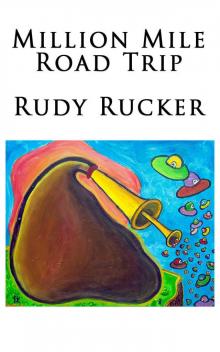 Million Mile Road Trip
Million Mile Road Trip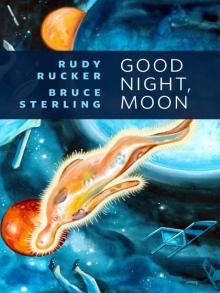 Good Night, Moon
Good Night, Moon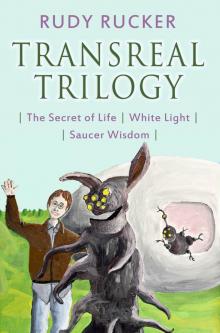 Transreal Trilogy: Secret of Life, White Light, Saucer Wisdom
Transreal Trilogy: Secret of Life, White Light, Saucer Wisdom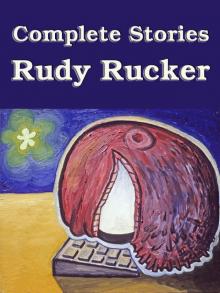 Complete Stories
Complete Stories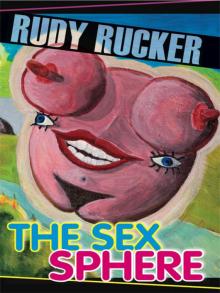 The Sex Sphere
The Sex Sphere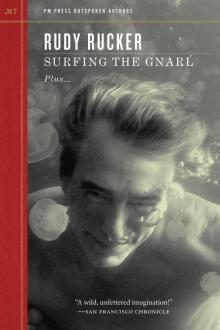 Surfing the Gnarl
Surfing the Gnarl Software
Software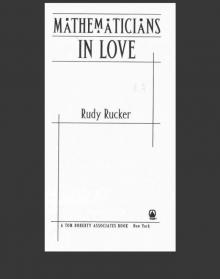 Mathematicians in Love
Mathematicians in Love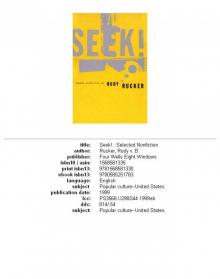 Seek!: Selected Nonfiction
Seek!: Selected Nonfiction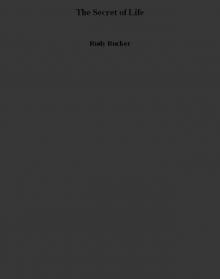 The Secret of Life
The Secret of Life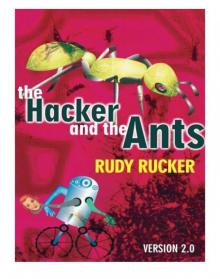 The Hacker and the Ants
The Hacker and the Ants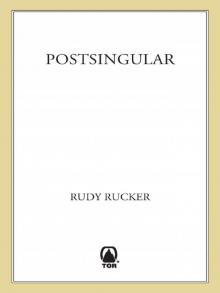 Postsingular
Postsingular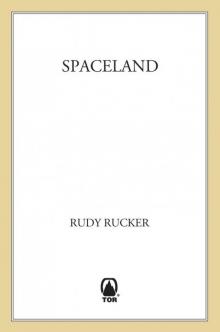 Spaceland
Spaceland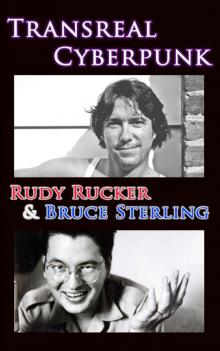 Transreal Cyberpunk
Transreal Cyberpunk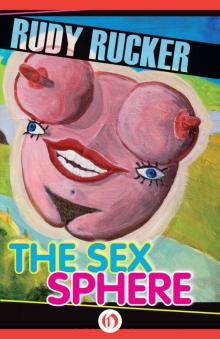 Sex Sphere
Sex Sphere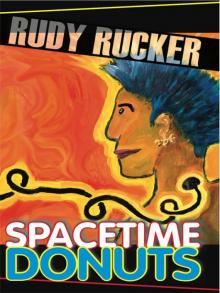 Spacetime Donuts
Spacetime Donuts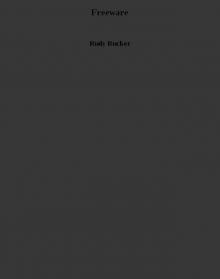 Freeware
Freeware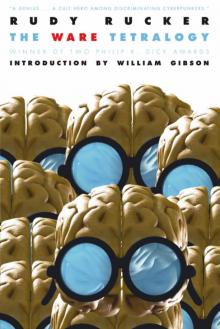 The Ware Tetralogy
The Ware Tetralogy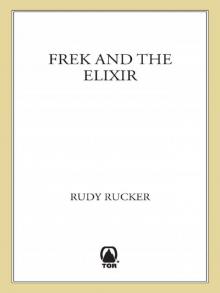 Frek and the Elixir
Frek and the Elixir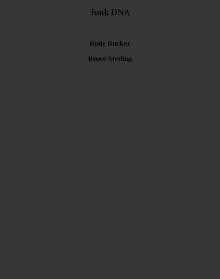 Junk DNA
Junk DNA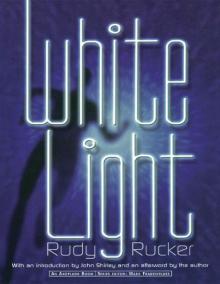 White Light (Axoplasm Books)
White Light (Axoplasm Books)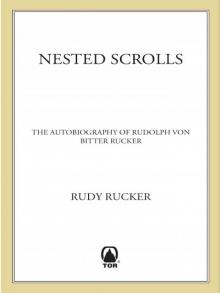 Nested Scrolls
Nested Scrolls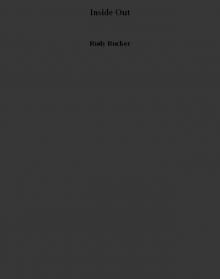 Inside Out
Inside Out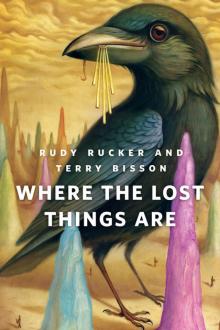 Where the Lost Things Are
Where the Lost Things Are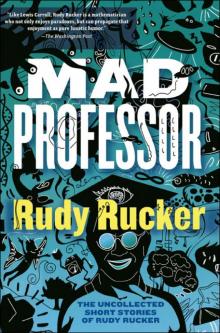 Mad Professor
Mad Professor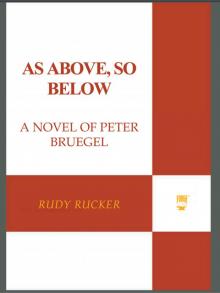 As Above, So Below
As Above, So Below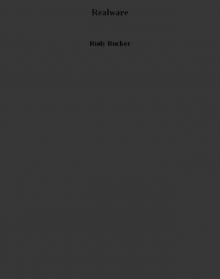 Realware
Realware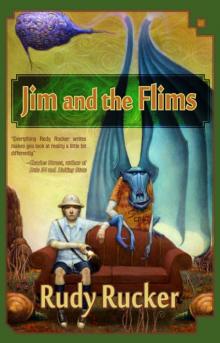 Jim and the Flims
Jim and the Flims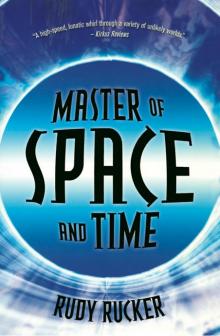 Master of Space and Time
Master of Space and Time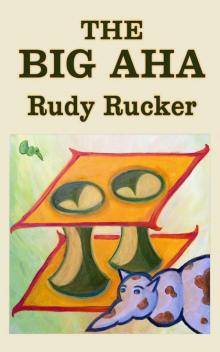 The Big Aha
The Big Aha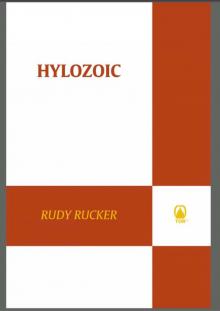 Hylozoic
Hylozoic